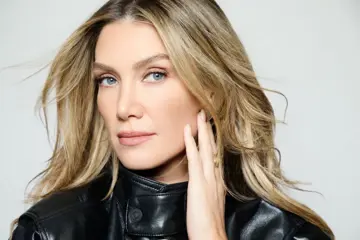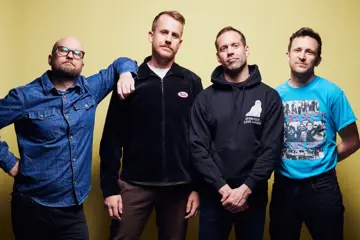 John Cameron Mitchell
John Cameron MitchellJohn Cameron Mitchell is, finally, on his way to local shores with The Origin Of Love: The Songs & Stories Of Hedwig. A production he describes as "really just a rock show", Mitchell's first-ever visit to Australia finds him performing the songs from his beloved musical Hedwig And The Angry Inch, which was first brought to the stage in 1998, then screen in 2001. His tale of a genderqueer East German singer has proven unexpectedly popular and universal; touring the world and finding huge audiences in queer-unfriendly Korea - "I attribute it to the divided peninsula," says Mitchell, 55, of the film's Korean popularity, "the flag has the yin and yang symbol, which is similar to the divided state, in the Hedwig film, that so many people get tattoos of.
"It crosses all gender and sexuality boundaries," Mitchell continues, "and seems to work in any culture." Those who love the musical find solace in its depiction not just of queerness, but also of outsiderdom. "It's such a privilege to like the people who like your work. A lot of famous actors... find they have the most obnoxious fans, just because they're an Avenger. I don't have that. There's a very small, fervent, lovely core who loves Hedwig."
That fervency started early, the initial off-Broadway production managing to stay on stage due to repeat viewings. "One woman saw it 450 times in our two-year off-Broadway run," Mitchell offers. "Glenn Close came back 11 times. We got super-fans very early and it meant a lot to us. We barely hung on, we were not a big sell-out show. The film was actually a flop in theatres, people only discovered it afterwards. Even when it was on Broadway [in 2014], we were a success, but it wasn't Jersey Boys or Hamilton... It's never going to be a mainstream thing. It's always going to be cult, which, to me, is better. That means sometimes I can't pay my bills, but the people who love it really love it."
Though the Hedwig film wasn't a financial success, Mitchell - who served as its director and star - scored a Golden Globe nomination for his leading performance, which, in turn, led to lots of Hollywood offers. "But I knew that if I just threw myself into any old thing, I wouldn't be happy. I was older then, so I wasn't swayed by glamour or money," Mitchell recounts. In fact, he was downright wary of the trappings of a big-budget production, especially when it came to producers. "When you avoid working with assholes, that just naturally makes it take longer. Finding the financiers who aren't assholes, that can be tricky."
"It's never going to be a mainstream thing. It's always going to be cult, which, to me, is better. That means sometimes I can't pay my bills, but the people who love it really love it."
Don't miss a beat with our FREE daily newsletter
Mitchell eventually directed 2006's Shortbus, best known for featuring non-simulated sex. "Shortbus made no sense in a career way," he admits. "It had lots of sex, so there was no chance of it making a lot of money or even being widely distributed. But I wanted to challenge my peers, and America's fear of sex, in a way that [explored] problems with connection through the language of sex... We never really paid our investors back, but, to this day, I still meet a lot of people who say they saw it at a certain time and it really helped them. That's the best compliment. I believe in art as a healing thing. And, if it's not, and if it's not a little scary when you're making [it], it's probably not worth doing."
After 2010's Oscar bait-ish, grieving-parents drama Rabbit Hole - which starred Nicole Kidman and Aaron Eckhart - his new film, How To Talk To Girls At Parties, is "a little bit more fun". Based, very loosely, on a short story by Neil Gaiman, it's a tale of punks meeting aliens in late-'70s London. Starring the ever-amazing Elle Fanning ("She's a miracle," Mitchell enthuses. "Every take, from first take to last, is perfect... I really think she's going to be one of our greatest screen actresses"), it's a giddy, brightly-coloured, ridiculous, pop depiction of first love and formative sexual experiences.
Mitchell's goal was to "make a film that a teenager would say is their favourite film of all time", but, he offers, "There's other little messages in there. There's a Brexit, nativist metaphor: people in British flags jumping off buildings to try and avoid contamination with aliens. There is a little bit of panic in there about what it means to close ranks, to die pure. That relates to the Trump/Brexit/Marine Le Pen way of thinking."
He saw the tone of How To Talk To Girls At Parties as running counter to the constant stream of dystopian settings in YA novels and movies. "It's a weird thing to be young now, and to be told that, environmentally and politically, it's all downhill from here. It's scary. That was something that had to be countered, with this film, as well. This is our small, modest, romantic, punk way of screaming into that void."
Mitchell wanted How To Talk To Girls At Parties to be a sex-positive film for young people. Queer and trans rights may have undergone an evolution since Hedwig..., but Mitchell sees societal views on sex being more confused, regressive. "Even though people can be free to explore their sexuality, and the internet has given people access to so much stuff, in a way capitalism has won. Sex has been categorised and capitalised, there's a transactional element to sex, while panic about consent and harassment has risen... there's this increased jitteriness about the very concept of sex. Young people, in turn, are having less sex; because of the messiness of it, it's easier just to keep it online. In this climate, Shortbus might not even be able to be made anymore, it might not be able to find finance. It feels like we've gone a little bit backwards in terms of our relationship with sex."
The Origin Of Love: The Songs & Stories Of Hedwig plays 6 July at Sydney Opera House, 10 July at Hamer Hall, and 17 July ay QPAC















